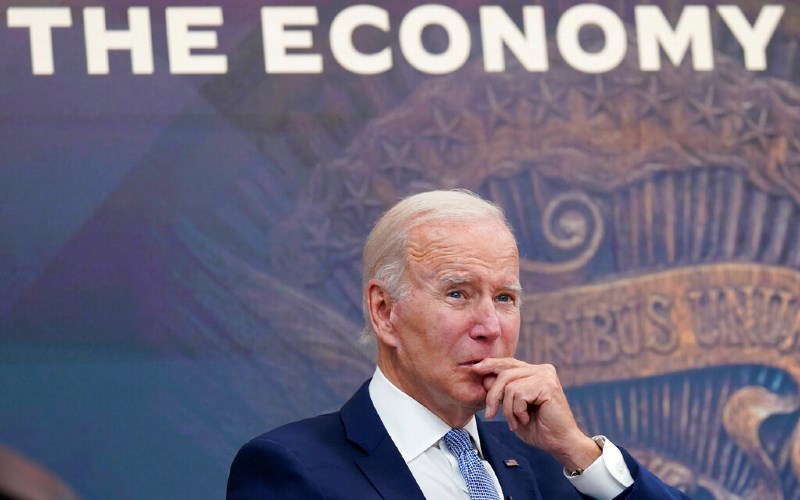A recession is, by definition, negative economic growth in two back-to-back quarters, meaning a six-month period. The country officially crossed hit that marker this week when the Commerce Dept. announced the economy shrank .9% percent from April to June. That figure comes after the January-to-March figures showed the economy shrank 1.6%. (Also of note: An inflation gauge that is closely tracked by the Federal Reserve jumped 6.8% in June from a year ago, the biggest increase in four decades.)
 So, yep, the U.S. has officially hit a recession. But you wouldn’t know it if you listened to Treasury Secretary Janet Yellen. She said this week a recession is caused by other factors such as job losses and massive layoffs, business closures, and family budgets that are under “immense” strain. Those are not happening, she said, so there is no recession.
So, yep, the U.S. has officially hit a recession. But you wouldn’t know it if you listened to Treasury Secretary Janet Yellen. She said this week a recession is caused by other factors such as job losses and massive layoffs, business closures, and family budgets that are under “immense” strain. Those are not happening, she said, so there is no recession.
In a defensive-sounding speech to White House reporters, President Biden rattled off a list of more positive economic signs, such as single-digit unemployment, new job hirings, and a rise in consumer spending.
“That doesn’t sound like a recession to me,” he concluded, then walked away from the podium grim-faced and refused to answer their questions.
 EJ Antoni, an economic analyst at The Heritage Foundation, tells AFN the administration is being dishonest when it cherry-picks economic numbers to paint a positive picture. In reality, he says, beneath those claims is a worrisome trend for our country.
EJ Antoni, an economic analyst at The Heritage Foundation, tells AFN the administration is being dishonest when it cherry-picks economic numbers to paint a positive picture. In reality, he says, beneath those claims is a worrisome trend for our country.
"It just amazes me that they are citing the increase in consumer spending as something that is good,” he says, citing one example, “except, when you dig into the numbers, you find that that increase in spending is just being fueled by a depletion of savings.”
In other words, yes, families are paying more for their groceries, gasoline, and clothing – which have jumped in price due to inflation – but they are dipping into their savings to do it.
With families struggling to the point that disposable income is plummeting, Antoni concludes that is not a “sustainable path” for economic growth.
Inflation causing 'pain' to families
Alfredo Ortiz, of the Job Creators Network, tells AFN the American public already knew the country has entered a recession before the official numbers were released. That’s because families are businesses, he says, have already felt the “squeeze” from a slowing economy and rising prices.

In fact, because the Commerce Dept. is reviewing economic numbers from months before, now halfway into 2022, the reality of a worsening economy has hit family budgets, mom-and-pop businesses, and laid-off employees long before a federal bureaucrat confirms it.
"Despite the spin," Project 21 spokesman Derryck Green tells AFN, "Americans know better, particularly when they are paying $500 more per month for groceries and $250 more per month for gas, thanks to inflation being at 9.1%."

Lee Schalk, vice president of policy at American Legislative Exchange Council, tells AFN the American public has been down this economy-destroying road before during the Jimmy Carter administration. Those difficult years during the 1970s created a hard time for families and businesses, and we are now seeing the same inflation rates 40 years later, he warns.
Back in 1979, in the middle of double-digit inflation, long gas lines, and a lingering recession, President Carter addressed the nation in his famous “malaise” speech. He assured the American public he understood their struggles - "I feel your pain," he said - and told the struggling country he had been doing some serious soul-searching about America’s future after listening to their opinions, fears, and complaints.
 “It's clear that the true problems of our nation are much deeper,” Carter said, “deeper than gasoline lines or energy shortages, deeper even than inflation or recession. And I realize more than ever that as president I need your help.”
“It's clear that the true problems of our nation are much deeper,” Carter said, “deeper than gasoline lines or energy shortages, deeper even than inflation or recession. And I realize more than ever that as president I need your help.”
This week, at the same time he was denying the U.S. has entered a recession, President Biden touted the “Inflation Reduction Act” that includes $370 billion to “combat” climate change; new spending for Obamacare subsidies; $78 billion for hiring new agents at the IRS; and a new minimum corporate tax of 15%.
All of the government spending is “upfront” in the Act and the deficit-reduction plan, which is helpful to fight inflation, comes later, Matthew Dickerson, a federal budget expert at Heritage, warned this week.
“The root of the problem is reckless federal spending,” Schalk warns, “and it's caused so much pain for Americans, millions of Americans, throughout the country."







